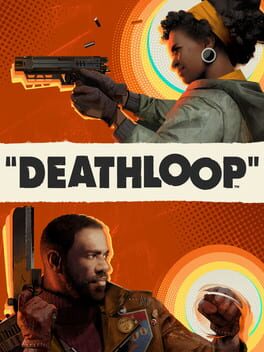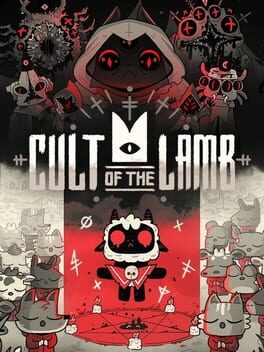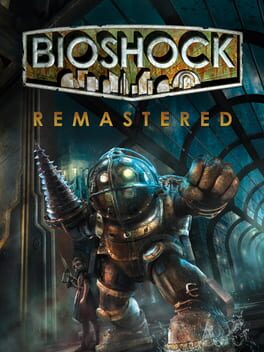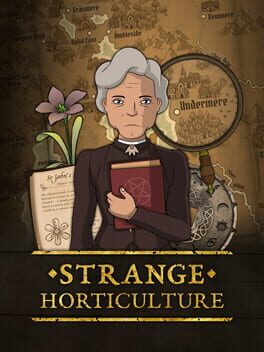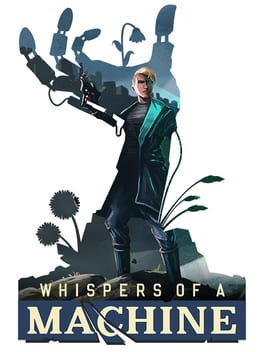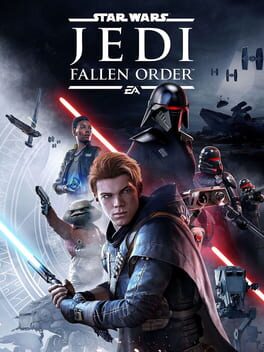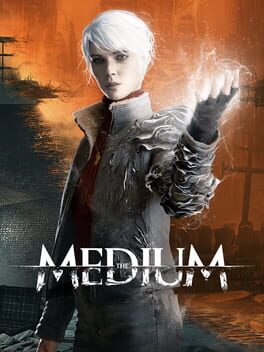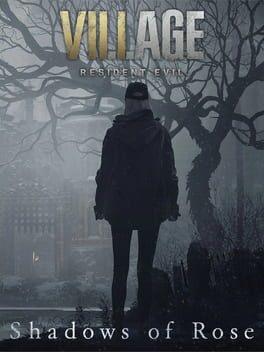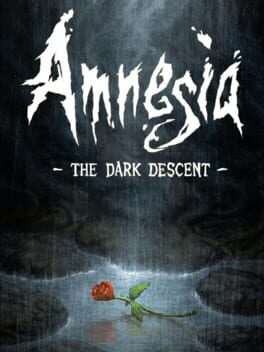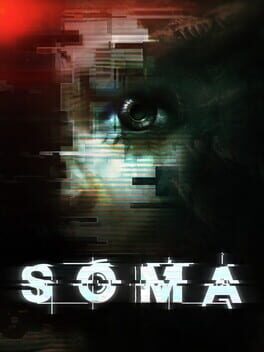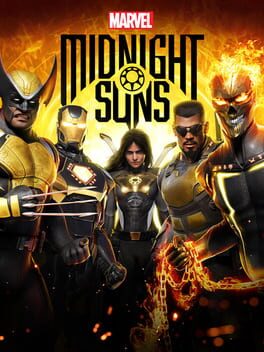ResidentRed
2021
Deathloop had me in the beginning with its quirky style and story, Colt’s investigation into Blackreef interesting for a time. Unfortunately the longer I played, the less invested I became. The four areas recycled the entire game, even with the differences between times of day, just became boring—this extends to the lack of variety in enemies as well. I often felt frustrated with the stealth too, detection being overly sensitive even when stationary in full cover.
But I liked Colt and Julianna, their banter silly and a little bit endearing. It’s just a shame the story fizzled out like it did. Like always I finish what I start, so it’s not like I didn’t give it a chance.
But I liked Colt and Julianna, their banter silly and a little bit endearing. It’s just a shame the story fizzled out like it did. Like always I finish what I start, so it’s not like I didn’t give it a chance.
Yikes?
With a surprise release, The Short Message got a lot of people talking, and understandably so with it being related to Silent Hill. I jumped in with cautious optimism, thank goodness for that. The environments looked great, with the graffiti everywhere and the general atmosphere. The only thing I’d nitpick regarding the visuals was the character HAVING HER HAIR UNDER HER GLASSES? As a spectacled person I found it a bizarre design choice.
As for the meat, gameplay-wise it took a lot from other psychological horror titles with walking around doing very little. Repetitive chase sequences spiced it up a bit, with one chase in particular being a horrid experience. It reminded me of many indie games—unfortunate, yes, but it didn’t do a whole lot to stand out from the crowd and instead relied on the big name attached to it. The narrative on bullying and social media, while prevalent today, was extremely heavy-handed to the point the protagonist was downright unlikeable. Let's face it, depression is common, bullying is common, the pressure of social media is common; it didn't deserve praise for including all those topics in the shallow ways it did. People, real people, actually have nuance and depth.
With a surprise release, The Short Message got a lot of people talking, and understandably so with it being related to Silent Hill. I jumped in with cautious optimism, thank goodness for that. The environments looked great, with the graffiti everywhere and the general atmosphere. The only thing I’d nitpick regarding the visuals was the character HAVING HER HAIR UNDER HER GLASSES? As a spectacled person I found it a bizarre design choice.
As for the meat, gameplay-wise it took a lot from other psychological horror titles with walking around doing very little. Repetitive chase sequences spiced it up a bit, with one chase in particular being a horrid experience. It reminded me of many indie games—unfortunate, yes, but it didn’t do a whole lot to stand out from the crowd and instead relied on the big name attached to it. The narrative on bullying and social media, while prevalent today, was extremely heavy-handed to the point the protagonist was downright unlikeable. Let's face it, depression is common, bullying is common, the pressure of social media is common; it didn't deserve praise for including all those topics in the shallow ways it did. People, real people, actually have nuance and depth.
2022
Talk about addictive. Cult of the Lamb was weird and wonderful, all about maintaining a cult (through nice or nasty means) while trying to achieve godhood. It was part colony sim with building up a camp to suit the needs of followers, including things like crops, outhouses and a variety of buildings. It was even possible to pretty up the place with decorations, which I spent a ridiculous amount of time trying to do. Sure, keeping the cult alive could be tough, but at least it looked nice.
Then there was the roguelike grind, the aim to defeat the big rival bosses. It was mindless, with interesting abilities and weapons, some more powerful than others—it was up to RNG on what was dished out, some curse / weapon combos making it a breeze. The overall gameplay loop was excellent, with even more content added since release.
Then there was the roguelike grind, the aim to defeat the big rival bosses. It was mindless, with interesting abilities and weapons, some more powerful than others—it was up to RNG on what was dished out, some curse / weapon combos making it a breeze. The overall gameplay loop was excellent, with even more content added since release.
2020
Baldur’s Gate 3 spent years in early access, and I ignored it completely like I do with any other early access title. Then it released and blew away any and all expectations. There’s nothing like getting lost in a story full of colourful characters, I honestly felt transported back to DA: Origins with the sheer sense of wonder. Segmented into three acts, it had so many epic moments, and even with combing through the maps searching for encounters, I still missed content. The scope was just unbelievable, and I can't quite say how magical of an experience it was for me.
I went with a Druid, a self-sacrificing goody two shoes that made friends with everyone, so this leaves plenty of room for alternate runs with more morally questionable Tavs. In fact, the replayability is incredible when taking into account every choice over the course of the game—romance options, alliances, to be merciful or ruthless. The freedom was there to shape a hero or a villain.
I loved it, and I'll go so far to say it was the best I've played in years.
I went with a Druid, a self-sacrificing goody two shoes that made friends with everyone, so this leaves plenty of room for alternate runs with more morally questionable Tavs. In fact, the replayability is incredible when taking into account every choice over the course of the game—romance options, alliances, to be merciful or ruthless. The freedom was there to shape a hero or a villain.
I loved it, and I'll go so far to say it was the best I've played in years.
2016
I’ll never forget my first Bioshock experience, so it was great to delve back into Rapture with its politics and downright disturbing lore. My opinion on it being one of the best narratives in the gaming world didn’t change, every character’s spiral into madness more than interesting to listen to. Even the atmosphere held up, albeit I was less scared this time around.
The combat was still fun as well, I preferred using the wrench; arguably the most powerful weapon, and there was something about going around bashing everything. Plasmids obviously had their uses to, whether it was using them on the environment or just experimenting with what was most enjoyable.
As for the added content, I liked and spent time on both the Challenge Rooms and Museum of Orphaned Concepts.
The combat was still fun as well, I preferred using the wrench; arguably the most powerful weapon, and there was something about going around bashing everything. Plasmids obviously had their uses to, whether it was using them on the environment or just experimenting with what was most enjoyable.
As for the added content, I liked and spent time on both the Challenge Rooms and Museum of Orphaned Concepts.
2022
Strange Horticulture was a serene experience, its gameplay revolving around identifying plants and solving mysteries that were embedded in the occult. It took place almost entirely behind the counter of a shop, with customers coming in with various requests, the idea to find the appropriate plant for their ailments. Any adventures outside the shop were text based, but that didn't detract from how engaging it was, quite the opposite. Within the first few minutes I knew exactly what I was going to get with the rest of the game: an atmospheric point and click indie about a strange town. Simple, yet effective.
There were even some decisions to make that involved a coven and a cult, both parties at odds with each other. It was well done in its subtle way, but I honestly had a blast just sorting my plants.
There were even some decisions to make that involved a coven and a cult, both parties at odds with each other. It was well done in its subtle way, but I honestly had a blast just sorting my plants.
Set in a post-AI futuristic dystopia, Whispers of a Machine presented a murder mystery to solve as Vera, a cybernetically augmented special agent. Humanity versus AI is more relevant than ever these days, so I enjoyed the topics it brought up, even if some threads were never truly resolved. There were options on how to go about the investigation and approach situations, the three paths relating to being empathetic, analytical, or assertive, each having their own abilities to use during puzzles and dialogue.
I liked Vera as a character, the sort of no-nonsense woman that had a subtle sense of humour. Even though it differed from Kathy Rain (Clifftop Games' other title), I still found it to have its own strengths.
I liked Vera as a character, the sort of no-nonsense woman that had a subtle sense of humour. Even though it differed from Kathy Rain (Clifftop Games' other title), I still found it to have its own strengths.
I'm in the minority for not enjoying Jedi: Fallen Order. It didn't feel particularly fun, the story nor the characters sparking interest. I’ll even go so far as to say the tacked on Souls-like elements didn’t suit it—when you think of Souls games, what comes to mind? For me it’s the bosses which usually offer a spectacle as they’re supposed to be memorable and a big deal, but I find it hard to recall a single one here. Loot is generally a major factor as well when it comes to Souls-like, giving a sense of accomplishment over time, but that was missing altogether with Jedi: Fallen Order. It was just hard for the sake of jumping on that train.
What was left was just a whole lot of platforming, or rather, “parkour” that made me want to abandon the game, and I don't make a habit of doing that.
What was left was just a whole lot of platforming, or rather, “parkour” that made me want to abandon the game, and I don't make a habit of doing that.
2019
Capcom modernising their Resident Evil catalogue was no small task, and they obviously had to make some tough decisions, but the end result was more than impressive. With such a revitalisation of the series (starting with 7 respectively) it made me fall in love all over again. Out with the old, in the new: third-person, photorealistic visuals, tweaks to the story, expanded maps, just a complete overhaul.
Resident Evil 2 was fantastic to play, the police department one of the best experiences—including all the backtracking. If the game was set solely in that station I would’ve loved it just the same. The added threat of Mr X stomping the corridors made for some stressful moments, the stalker enemy a mechanic Capcom clearly likes. Definitely a favourite of mine, I hope my love for the franchise never fizzles out.
Resident Evil 2 was fantastic to play, the police department one of the best experiences—including all the backtracking. If the game was set solely in that station I would’ve loved it just the same. The added threat of Mr X stomping the corridors made for some stressful moments, the stalker enemy a mechanic Capcom clearly likes. Definitely a favourite of mine, I hope my love for the franchise never fizzles out.
2018
Marvel's Spider-Man was special to play, one of the reasons being there's genuinely nothing like web-swinging around New York; I remember loving the older Spider-Man games for this reason too. This time around it wasn't the only impressive thing about the game, though, as it kept me on my toes with a compelling story and epic scenes. I was in a state of awe a lot of the time as everything just became more crazy. The combat was also extremely enjoyable, the freedom to move around with ease making it all the more fun.
Other than that, there was a lot to do—side activities and things to collect. Thankfully, its Open World Syndrome wasn't the most egregious.
Other than that, there was a lot to do—side activities and things to collect. Thankfully, its Open World Syndrome wasn't the most egregious.
2021
While it may have been hyped as a spiritual successor to the Silent Hill franchise, it’s not and should stand on its own merits. From my point of view, it was a decently made horror game that tried its best to capture the classic horror experience, and regardless if it succeeded or not, it’s still my favourite Bloober title to date. Life was brought to the character of Marianne, and I appreciated the cinematic quality that remained a constant throughout.
That said, the story itself was where things got complicated. When it comes to being deep and tackling sensitive subjects, it can either come across as respectful or the polar opposite, and I feel The Medium verged on the latter.
That said, the story itself was where things got complicated. When it comes to being deep and tackling sensitive subjects, it can either come across as respectful or the polar opposite, and I feel The Medium verged on the latter.
Shadows of Rose was the sole story DLC in the Winters' Expansion, and the final chapter for the Winters' arc. Rosemary took the stage, now a teen and struggling with her abilities. I adored the journey she underwent to accept herself, gameplay making use of her powers. Capcom is just on a role with the franchise, showing they're not afraid to try different things with the setting—the fantastical themes on Village continued with Rose. I very much enjoyed it, and I'm only left excited for the future.
I used to watch other people play Amnesia: The Dark Descent when it was popular to do so, skip some years and I decided to try it for myself. There’s no doubt that it showed its age, but that was to be expected. I loved the Lovecraftian themes in the story, I ate up every little morsel I could. As for the gameplay itself, I think the sanity was done well—many other games have tried to replicate it for a reason—but it’s certainly an acquired taste. The physics based puzzles were a favourite, Frictional's mechanics always satisfying to me.
While the enemies were fine, I will say it lost something after realising most of the monsters despawned after not seeing me for a few minutes. It was easy to avoid them, danger mostly an illusion. Not entirely a bad thing, but rather than being obstacles that posed a threat, they were obstacles that wasted time.
While the enemies were fine, I will say it lost something after realising most of the monsters despawned after not seeing me for a few minutes. It was easy to avoid them, danger mostly an illusion. Not entirely a bad thing, but rather than being obstacles that posed a threat, they were obstacles that wasted time.
2015
SOMA told a phenomenal story about consciousness, identity, and preservation. Sure, I've come across the existential crisis of what makes us human a number of times in horror and science fiction alike, but it was done so damn well here, each new revelation drip-fed over time.
Stealth was necessary for getting past the game’s monsters, with each type having their own detection quirk depending on location, either relying on sight, sound, or movement. There was a balance between struggling to stay alive against the assortment of enemies and the quiet moments where the atmosphere seeped into my bones. I’ll recommend this game for years to come.
Stealth was necessary for getting past the game’s monsters, with each type having their own detection quirk depending on location, either relying on sight, sound, or movement. There was a balance between struggling to stay alive against the assortment of enemies and the quiet moments where the atmosphere seeped into my bones. I’ll recommend this game for years to come.
Marvel’s Midnight Suns was a weird mix of systems, the concoction consisting of a hub area with exploration and relationship management along with missions with turned based combat and deck building. Many have preferred the action itself rather than the friendship busywork, but the whole package just clicked with me. I couldn’t help but like the drama and dysfunctional family dynamics.
It shouldn’t be compared to XCOM, though, as while being turn based it differed quite a bit. Combat took place in small arenas and was simplified overall, cards acting as skills with the choice of upgrading them as well as swapping them in and out. Again it worked for me to the point I was addicted to the loop.
It shouldn’t be compared to XCOM, though, as while being turn based it differed quite a bit. Combat took place in small arenas and was simplified overall, cards acting as skills with the choice of upgrading them as well as swapping them in and out. Again it worked for me to the point I was addicted to the loop.
